12 Ways To Add Flavor To Roast Duck
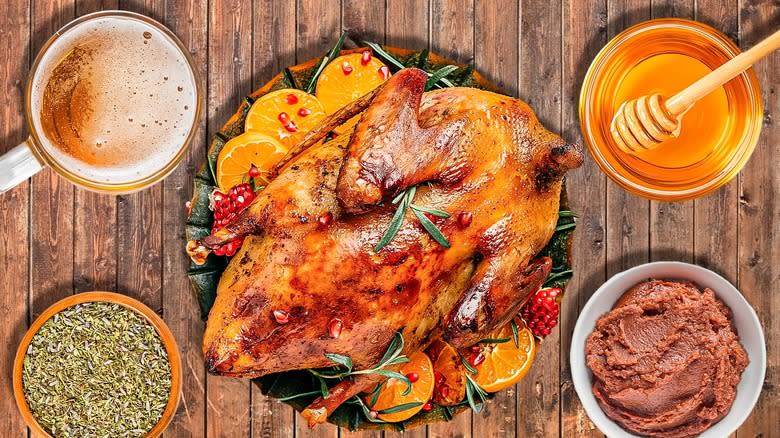
Many people are intimidated to cook duck and would much sooner choose to roast a chicken than attempt it. The meat is darker, can dry out quickly, and become tough, it needs to be cooked to the right level of "pinkness" on the breast (although if you're roasting a duck whole, you'll have to give up on pink breast meat) and the thick, fatty skin is often hard to render enough to get it crispy. However, with just a few tips and know-how, you can easily roast a chicken without too much effort. With the holidays coming up, it's a great option to make for your family or friends, and takes less time than turkey to cook.
Duck is a type of poultry that can be spiced, sauced, marinaded, and basted with so many flavors that there's definitely a combination that will suit your taste and wow your guests. Its deep meatiness pairs well with warm spices, citrus, wine, herbs, sweetness, and so much more. When looking at the different ways that different cultures add flavor to ducks, you'll realize the possibilities are truly endless. As a home cook and food writer, I've roasted duck countless times and learned from my mom how to make a succulent roast bird according to our cultural traditions. Once I mastered that way, I had the confidence to branch out and experiment with other flavor combinations. These are some of the ways that I've found work best to add flavor to roast duck.
Read more: Vinegar Cooking Hacks You'll Wish You Knew Sooner
Dry Rub
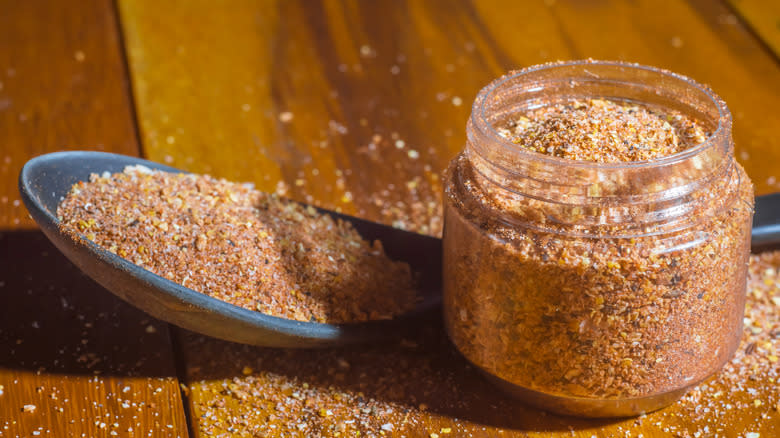
Something that people often get wrong with duck is to treat it like a chicken or turkey, which are less fatty birds. In truth, you don't need to add any oil or butter to duck to ensure it stays juicy and not dry. This is because duck already has so much fat, and you can use the rendered duck fat to baste it while cooking. Because of the fatty layer underneath the skin, it can also be hard to achieve crispy skin, which means you want to dry out your bird as much as possible before cooking. This is where using a dry rub can help you add flavor to roast duck while also drawing out some of the moisture. Instead of adding spices to oil and coating your duck with that, simply use dry seasonings, rub them all over the meat, and let them do their magic overnight.
The most important of all is salt, which will dry the brine and start to remove moisture while it seeps into the meat. That said, you can use any combination of dried spices and herbs that you like. You'll be surprised by how flavorful the result is, especially if you give them time (about a day or two) in advance. There are endless options for what kind of spice and herb mix to use as a dry rub, but whatever you like to use with chicken or red meat will work just as well with duck.
Five-spice
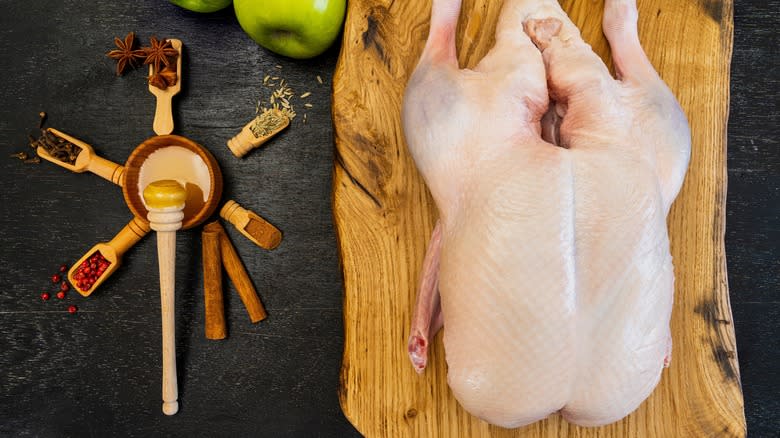
Five-spice is central to how roast duck is seasoned in Chinese and Taiwanese cooking, as well as used in other chicken and braised meat dishes. This powerful spice combination has both a sweet and savory element which works as one of the cornerstones for working with duck. While there are different mixes of spices, the five key spices are cinnamon, cloves, star anise, fennel seeds, and Sichuan pepper. Some blends might use different variations or substitutes for these five and also include things like ginger, orange peel, cardamom, nutmeg, white pepper, or licorice.
Five-spice also goes great with a wine reduction, an orange glaze, or even both wine and orange, which is a popular combination for roast ducks. Simply add it to your saucepan with some wine and cook it down into a reduction to be spooned over your cooked meat. Duck is great with a store-bought five-spice blend, but it's even more fragrant when you make your own mix. It's really easy to make a blend, and you can tweak it to your taste using the variations of the spices you love or have available. To make it at home, try this five-spice powder recipe.
Onions
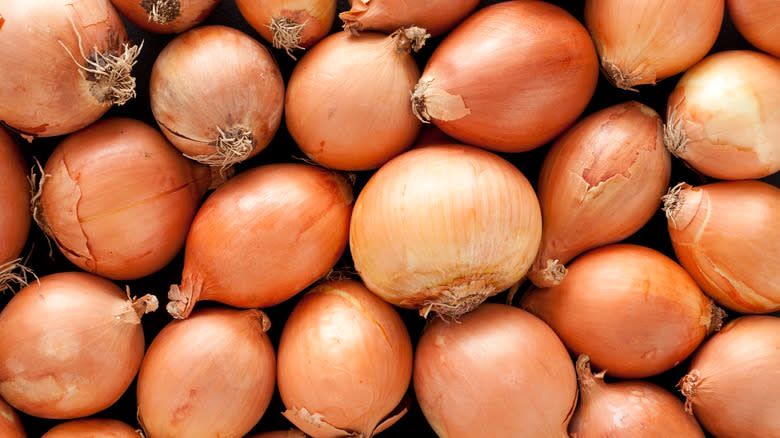
Onions are such a versatile ingredient for imparting flavor and are often used as the starting point for many recipes. When it comes to duck, onion is effective at both providing a delicious aromatic taste and tenderizing the meat while doing so. Many people use onions to tenderize tough meats, and it has the same effect on duck meat. Onions can be sliced thinly or into chunks or even grated and added to the bird before roasting.
One common method would be to use a mixture of grated onion, salt, and pepper, then add it to the duck underneath the skin. Carefully make an opening between the skin and the meat on the breasts without tearing through the skin. Using your fingers, gently push the onion into the space you've created, aiming to go deeper down so that the whole breast is covered with the mixture. Remember to add some into the duck cavity too. The result is a succulent and flavorful duck with a subtle onion juice flavor that doesn't overpower the duck's meatiness.
Miso
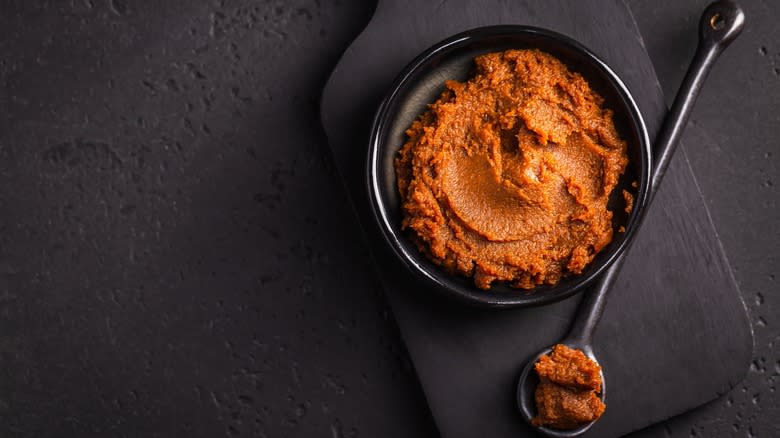
Miso paste is a wonderful ingredient to use in your cooking, beyond just in a soup. This salty soybean paste has an incredible umami flavor that works great in marinades of all kinds, and it's no different for adding flavor to roast duck. You don't need to use much miso paste to have a big impact. In truth, less is more, as you don't want your paste to create a thick layer that affects rendering. Instead, applying a sparing layer of miso paste on the outside of your duck will allow the savory flavor to seep into your duck meat without overpowering it.
For those who are new to using miso, start with a lighter paste which is a little milder and sweeter than darker miso. However, if you're a fan of the deep flavor of miso, using dark miso will amplify the umami in your duck dish. While you can use miso paste on its own to marinate your duck, you can also incorporate it into a marinade with other ingredients. However, if that includes sugar, be careful to only add the marinade to your duck near the end of cooking, as the sugar can burn and turn your miso marinade into a bitter char rather than a smoky flavor.
Honey
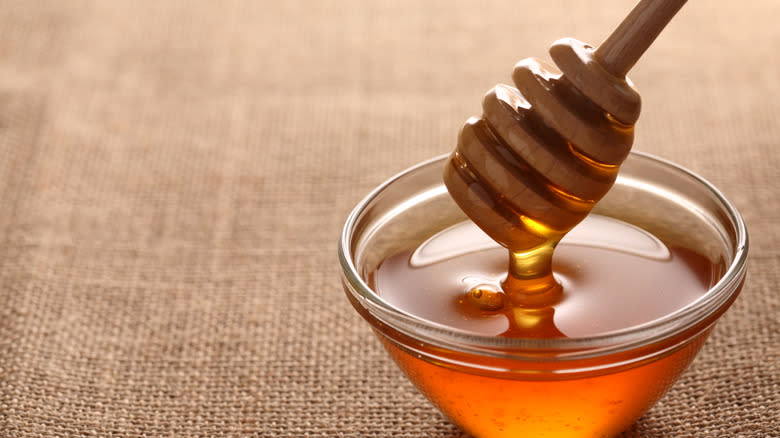
Honey and duck were born to go together, and it's a very common pairing you'll find in many restaurants. This is because not only does duck lend itself well to sweetness, but honey does an incredible job of crisping up duck skin. Honey is one of the most popular ways to achieve that shiny lacquered coating. The trick with using honey is to make sure you add it to your duck near the end of cooking, or else it can burn if cooked for too long. Instead, drizzle it onto your duck about 40 or 50 minutes into cooking to make sure the honey becomes a crispy, sweet glaze rather than a burnt sugar coating.
You'll still need to season your duck before, and we don't advise you to rely solely on honey to add flavor, but rather in combination with other seasonings. A great trick to do with honey is to whisk it into some of the duck drippings of juices and fat that fall into your roasting pan and baste that sweet, flavorful liquid onto your duck. This will add fattiness and flavor, while the honey ensures that you're not compromising on crisp skin. To match the sweetness of duck with honey while adding a new profile, using maple syrup in a similar fashion can reduce floral accents and develop a deeper, woodsy flavor instead.
Orange
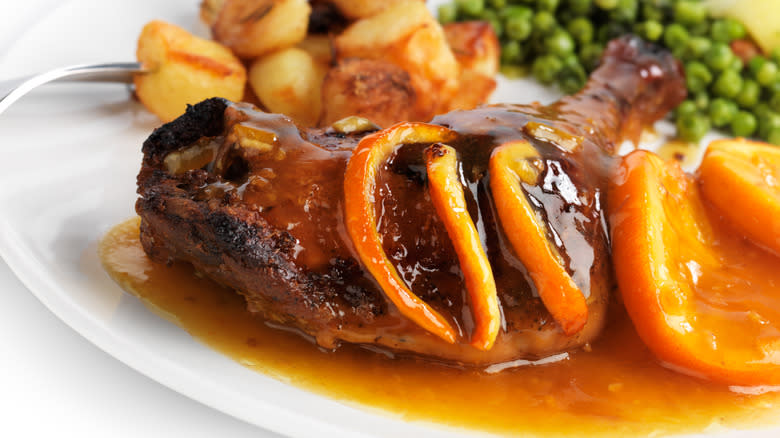
Duck and orange make for a very familiar pairing if you're familiar with the old-school dish, "Duck a l'orange," which is popular in many classic French restaurant menus. Old school doesn't mean outdated, though, because this citrus fruit is a popular marriage for a reason. Orange has elements of sweet, sour, and (especially if you use the zest) a little bitterness, all helping to balance out the duck's richness. You can also use fresh oranges and an orange liquor like Grand Marnier to amp up the orange flavor or even use orange marmalade as a ready-made glaze.
Use all parts of the orange — the juice, the flesh, and the skin — to make an impressive sauce to spoon over your duck, or add orange zest to your dry rub mixture and lather it all over the outside of the duck. Another method for adding flavor to duck is to use a whole orange placed inside the suck cavity. This will allow it to steam the duck from the inside with the oils from the orange skin, the same way inserting a whole lemon inside a roast chicken does. Warm up the orange in the microwave first because it will take a long time for the heat of the oven to reach the middle of your duck. Try this whole roasted orange duck recipe for your next holiday meal.
Gochujang
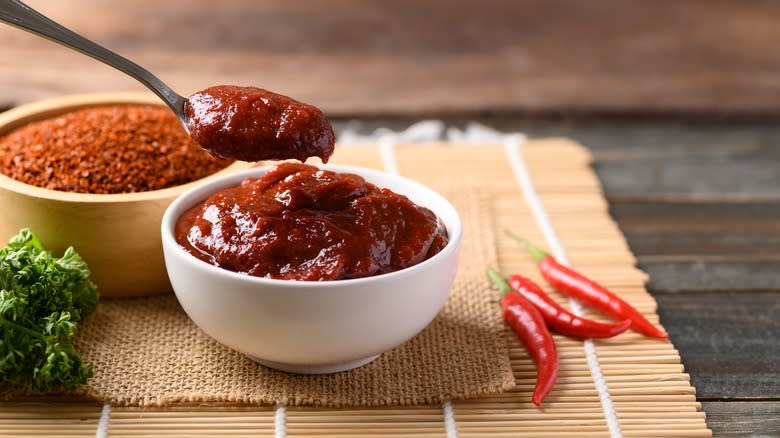
Another powerful flavor that you can add to roast duck is gochujang. This Korean paste is often sold in red tubes, found on the shelves at your Korean and East Asian grocery stores. Gochujang is a slightly spicy paste made from fermented red chile peppers and soybeans and is an easy way to add major flavor to any dish. Gochujang has a long history in Korea and it's a staple in the cuisine. It's most well-known for its use in dishes like bibimbap, Korean fried chicken, and tteokbokki, a popular street food of spicy rice cakes. It's also one of the main ingredients used in making kimchi. The bright red paste adds a deep salty, sweet, umami, and spicy kick to food and is great for marinating duck and for giving the skin a beautiful brown color on the skin.
Gochujang is such a well-rounded ingredient that you really don't need to use much else except maybe for some salt, but of course, you can mix it up with different flavors too. If you find the spice level too high, you can always dilute it with some ketchup or barbecue sauce or make a marinade with some lemon juice, vinegar, and honey (or maple syrup).
Pomegranate Molasses
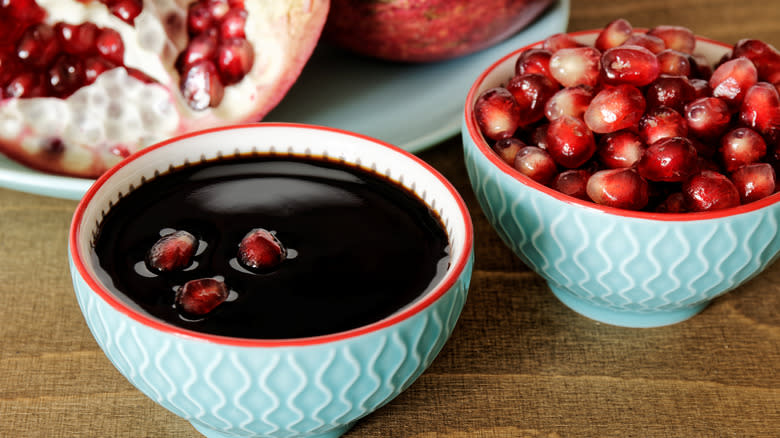
Pomegranate molasses is an incredible ingredient for use in savory cooking. This sweet and sour molasses is made from the juice of pomegranates that's been boiled down to a concentrated, thick syrup and is most used in North African, Middle Eastern, Persian, and Turkish cuisine. The viscous, ruby-colored liquid is so versatile that you can use it in salad dressings and vinaigrettes, baked goods, rice dishes, cocktails, and grilled and roasted meats. It's especially good with rich and meats like duck, because the sour tang helps to cut through the fatty skin, making the duck especially moreish. Pomegranate also compliments the gamy flavor of the duck meat in a surprising way.
While it will still result in a tasty result if used alone, the best thing about pomegranate molasses is how well it works with flavors like five-spice and orange; you're able to combine them together in a glaze of your choice or start with a dry rub and add the molasses near the end of cooking. It also works great as a base for a dipping sauce made from the drippings of your duck, mixed with some orange juice or five spices. Thicken it and spoon it over a piece of duck on your plate, and you'll never look back.
BBQ Sauce
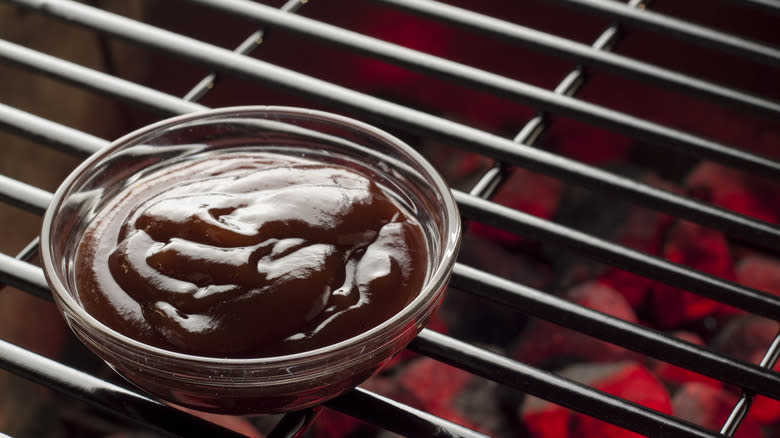
Compared to chicken wings, ribs, or burgers, BBQ sauce might not seem like the most obvious choice when it comes to roasting duck. Yet this sweet, smoky sauce is perfectly suited to duck's flavor. Consider Peking duck and how well it goes with hoisin, and you'll soon realize that the dark, thick, sweet sauce is really similar to the flavor elements of BBQ sauce and, in fact, is often considered to be the Chinese version of BBQ sauce.
BBQ sauce is like a ready-made glaze that you can brush your duck within the last few minutes of cooking (to avoid burning because of the sugar content). You can also cook it with the duck drippings to create a delicious dipping or serving sauce for your roast duck. Also, if you want to try to make your own, it's actually really easy to create some homemade sweet and tangy BBQ sauce that you can play around with to get to your preferred taste.
Piri-Piri
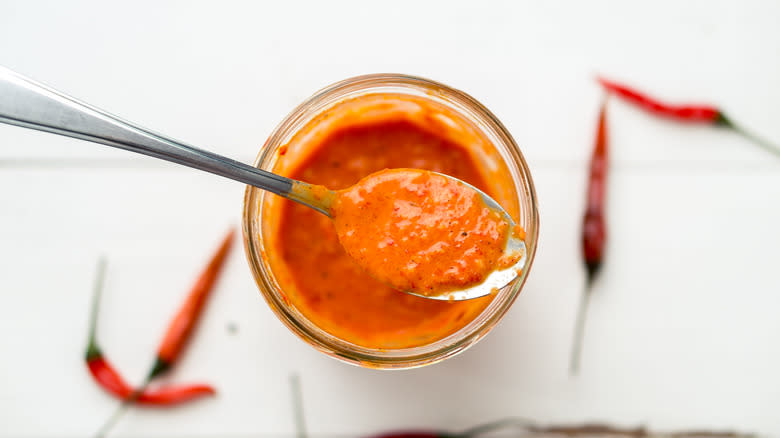
Piri-piri is a spicy sauce that originates from Mozambique, where a dinner table is not without a pungent jar or this mix of chiles, garlic, and vinegar. Used often to marinade grilled chicken or prawns, both in Mozambique and in Portugal, it's a versatile ingredient that you can use as a marinade or a base of a marinade for roasting a duck or other meats.
You can often find bottles of piri-piri sauce in larger grocery stores, or you can make your own at home in the simplest way. Simply crush or blend a few fresh chile peppers with some fresh garlic, and add some vinegar or lemon juice and salt. Smear it all over your duck for a few hours before cooking so that the flavors can seep into the meat. For those who like the kick of adding some chile heat to their cooking, this is the perfect ingredient to elevate many dishes, especially duck. The acid from the vinegar or lemon juice and the spiciness balance out the fatty skin of the duck, and the garlic creates a pleasing aromatic flavor.
Herbs De Provence
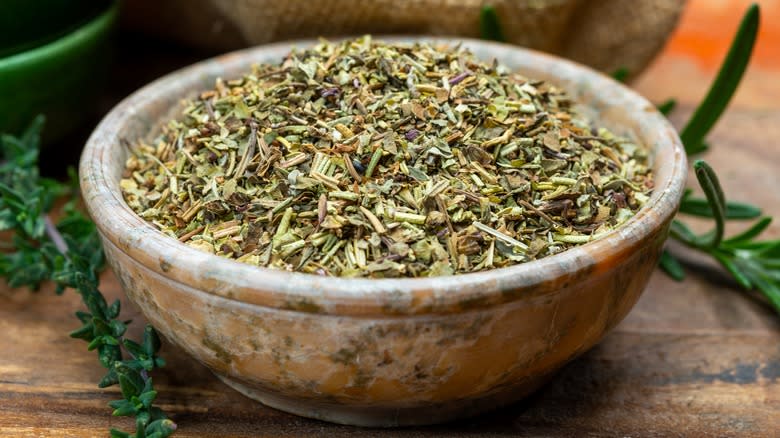
The fragrant blend of herbs called Herbs de Provence is easily recognizable for anyone who has been to France or even eaten at a French restaurant. Originating from the Provence area in the South of France, a region known for lavender fields, sunshine, and exquisite cooking, this mix of dried herbs is a staple for everything from grilled fish to roast potatoes, soups, stews, and countless other dishes. It's especially good for roasts because the woody herbs become crisp and smoky and add a depth of flavor.
While there are various recipes for this popular dried herb blend, the most common ingredients are marjoram, thyme, rosemary, parsley, tarragon, and fennel. If you have these herbs at home, you can mix them into herbs de Provence, or you can easily find a ready-made blend at most stores. Use it as a dry rub on your duck, along with some salt. As always, it will impart more flavor if you leave the bird to absorb the herbs overnight.
Beer

You may be more familiar with beer can chicken, the idea of roasting a whole chicken upright with an open can of beer in its center. In truth, you can use this very same method with roast duck to get an equally succulent result. Proponents of beer can chicken will tell you that the beer steams the chicken from the inside out, resulting in juicy meat that doesn't dry out, and adds a subtle but bright flavor that isn't overpowering. In fact, beer goes so well with duck that in China, it's become a common combination, even though it's not as well known in the West as its popular counterpart, Peking duck.
Not confident sticking a can of beer in the cavity of the duck? You can use beer as a basting liquid or make a sauce to accompany the duck, which will highlight the flavor of the beer even more. For dedicated beer lovers, the sacrifice of using a can in your cooking will be worth it.
Read the original article on Tasting Table.

